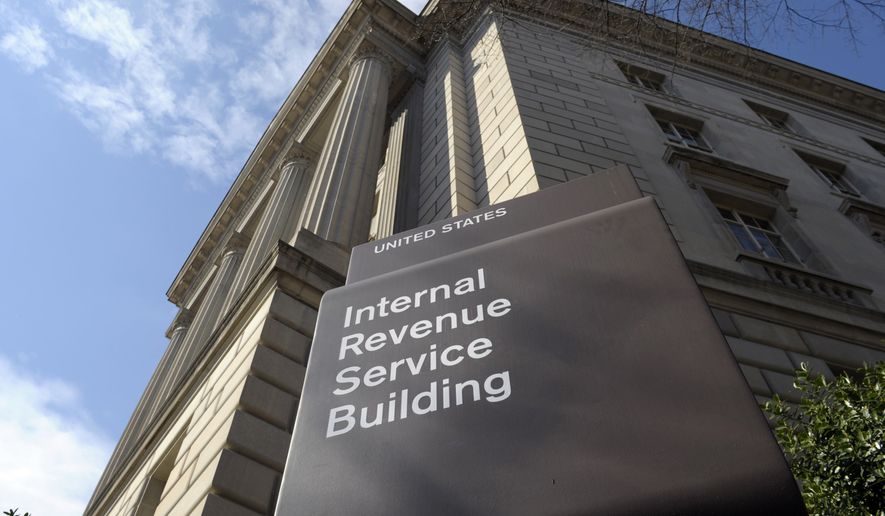The IRS gave taxpayers an additional day to file their returns — until midnight Wednesday — after the agency sustained a major breakdown that left its systems unable to accept online filings or payments for much of Tuesday.
The embarrassing chaos left agency leaders struggling for an explanation and forced them to apologize for bungling the biggest day of the year. It comes just as the agency begins to carry out Republicans’ tax cut law.
Returns and payments for the 2017 tax year now must be filed before midnight Wednesday, the agency said. The grace period applies to both businesses and individuals.
“This is the busiest tax day of the year, and the IRS apologizes for the inconvenience this system issue caused for taxpayers,” said acting IRS Commissioner David Kautter. “The IRS appreciates everyone’s patience during this period. The extra time will help taxpayers affected by this situation.”
The breakdown occurred Tuesday morning and lasted into the afternoon.
Users who tried to pay taxes directly from their bank accounts got a message saying the service was temporarily unavailable. The message also reminded taxpayers that their payments were still due.
While no concrete explanation was offered, Treasury Secretary Steven T. Mnuchin described the breakdown as a “high-volume technical issue.”
Democrats said the hiccups showed an agency that has been starved of cash for too long.
“What it means is that particularly small businesses and middle-class folks — they can’t file electronically, they can’t benefit from direct payment,” Sen. Ron Wyden of Oregon, the top Democrat on the Finance Committee, said Tuesday afternoon. “What we know for certain is the IRS’s lack of funding. … It compounds these problems.”
The direct-pay tool appeared to be back online by late afternoon, and the IRS told tax preparers that they had resumed accepting e-filed tax returns.
Even during the outage, TurboTax and H&R Block, two of the most popular private tax-filing services, said they were continuing to accept the e-filed returns. They said they were holding them until the IRS was able to accept them.
The IRS said it received 5 million tax returns on the last day of the filing season last year.
Republicans, who spent much of Tuesday trying to tout the benefits of their new $1.5 trillion tax-cut package, chided IRS officials who were appearing on Capitol Hill at a routine oversight hearing.
“This is game day for the IRS, and it seems the IRS can’t get out of the locker room,” said Rep. Greg Gianforte, Montana Republican.
The National Taxpayers Union said it was fitting that the outage happened as the House was taking up various bills this week to modernize the IRS, notably its information technology systems.
“The IRS has begun to respond, but follow-through in the hours and days ahead is vital to restoring public confidence,” said Pete Sepp, president of the nonprofit anti-tax activist group.
Before the snafu, congressional Republicans were using tax day to highlight the benefits from the tax cuts, which companies say have allowed them to make new hires and hand out thousand-dollar bonuses to their employees.
Republican leaders said they planned to hold votes to make permanent some of the law’s tax cuts for individuals, which were set to expire after 2025 in order to comply with budget rules.
“It is interesting that the Democrats are opposing the tax cut,” said Senate Majority Leader Mitch McConnell, Kentucky Republican. “If they are interested in making the individual rates permanent, that’s something we ought to take a look at. I don’t know why we wouldn’t want to do that.”
Democrats and liberal activists, meanwhile, rallied outside of the Capitol to argue that the major beneficiaries of the tax cuts were big corporations and wealthy people and that major provisions of the new law should be eliminated.
“Who benefited from this tax bill? Mainly wealthy CEOs, a lot of foreigners and the wealthiest people in America. Not the average working person,” said Senate Minority Leader Charles E. Schumer, New York Democrat.
The law permanently lowered the corporate tax rate from 35 percent to 21 percent, which Republicans said was necessary to give incentives to domestic companies to remain in the U.S. and foreign companies to relocate to America.
Mr. Schumer said Democrats want the corporate tax rate to be set at 25 percent and revenue from tax breaks for high earners to go toward infrastructure investments.
• This article is based in part on wire service reports.
• Stephen Dinan can be reached at sdinan@washingtontimes.com.
• David Sherfinski can be reached at dsherfinski@washingtontimes.com.




Please read our comment policy before commenting.